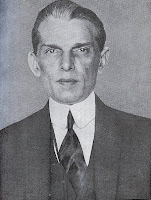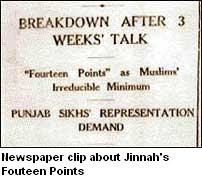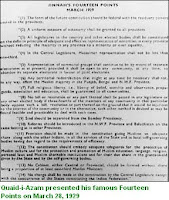M.A Jinnah presented his famous fourteen points on March 28,1929 to the Muslim League Council at their session in Delhi. Since all the Muslims opposed the Nehru Report, these points were to counter the proposals made in the Nehru Report. The points were to recommend the reforms that would defend the rights of the Muslims of the sub-continent.
These points were as follows:
1- The form of the future constitution should be federal, with the residuary powers to be vested in the provinces.
2- A uniform measure of autonomy shall be granted to all provinces.
3- All legislatures in the country and other elected bodies shall be constituted on the definite principle of adequate and effective representation of minorities in every province without reducing the majority in any province to a minority or even equality.
4- In the Central Legislature, Muslim representation shall not be less than one third.
5- Representation of communal groups shall continue to be by separate electorates: provided that it shall be open to any community, at any time, to abandon its separate electorate in favor of joint electorate.
6- Any territorial redistribution that might at any time be necessary shall not in anyway affect the Muslim majority in the Punjab, Bengal and the NWFP.
7- Full religious liberty i.e. liberty of belief, worship, and observance, propaganda, association, and education, shall be guaranteed to all communities.
8- No bill or resolution or any part thereof shall be passed in any legislature or any other elected body if three fourths of the members of any community in that particular body oppose such a bill, resolution or part thereof on the ground that it would be injurious to that community or in the alternative, such other method is devised as may be found feasible practicable to deal with such cases.
9- Sind should be separated from the Bombay Presidency.
10- Reforms should be introduced in the NWFP and Balochistan on the same footing as in other provinces.
11- Provision should be made in the Constitution giving Muslims an adequate share along with the other Indians in all the services of the State and in local self-governing bodies, having due regard to the requirements of efficiency.
12- The Constitution should embody adequate safeguards for the protection of Muslim culture and for the protection and promotion of Muslim education, language, religion and personal laws and Muslim charitable institutions and for their due share in the grants-in-aid given by the State and by local self-governing bodies.
13- No cabinet, either Central or Provincial, should be formed without there being a proportion of at least one-third Muslim ministers.
14- No change shall be made in the Constitution by the Central Legislature except with the concurrence of the States constituting the Indian Federation.








